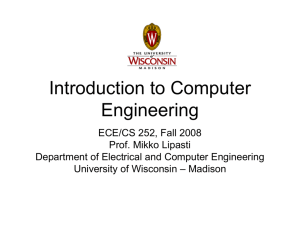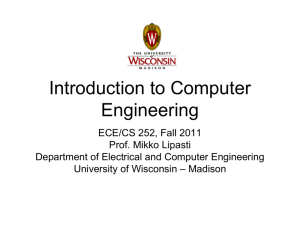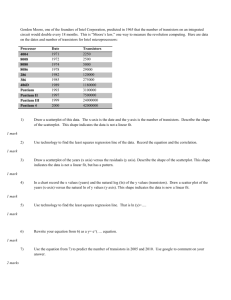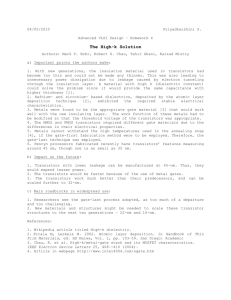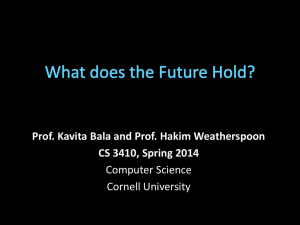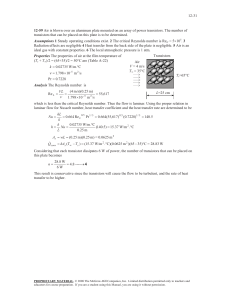Prof. Hakim Weatherspoon CS 3410, Spring 2015 Computer Science Cornell University
advertisement
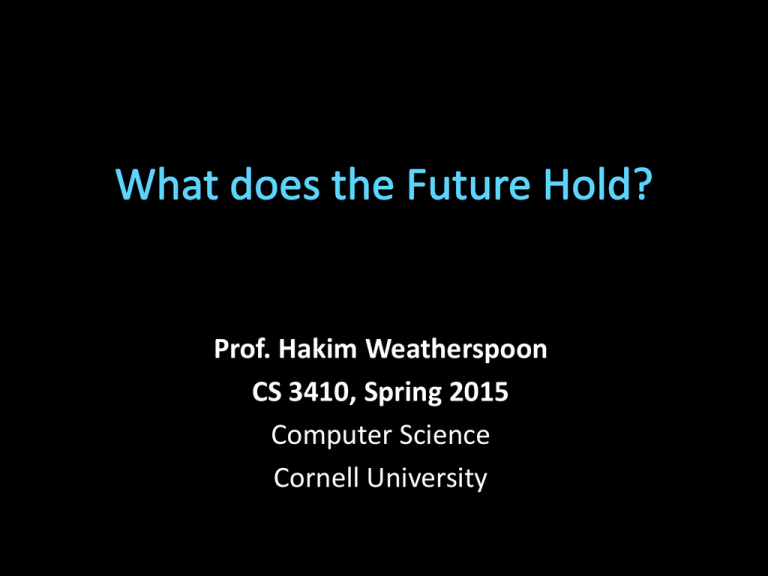
Prof. Hakim Weatherspoon CS 3410, Spring 2015 Computer Science Cornell University Final Project Demo Sign-Up via CMS. sign up Tuesday, May 12th or Wednesday, May 13th CMS submission due: • Due 6:30pm Wednesday, May 13th Prelim2 Results • Mean 61.5 ± 17.3 (median 62), Max 95.5 • Pickup in Homework Passback Room (216 Gates) Prelim 2 Scores 40 35 30 25 20 15 10 5 0 10 15 20 25 30 35 40 45 50 55 60 65 70 75 80 85 90 95 100 Prelim2 Results 264=16EB 264 214 =250 16kB Virtual Memory 8 byte= 64-bit V RWX 0 1 0 0 1 1 1 1 Physical Page Number 248 or 256TB 0x10045 0xC20A3 0x4123B 0x10044 16kB 34-bit = 48-bit – 14 bit Physical Memory Prelim2 Results 264=16EB 264 214 =250 250 x8 =253 8PB Virtual Memory 8 byte= 64-bit V RWX 0 1 0 0 1 1 1 1 Physical Page Number 248 or 256TB 0x10045 0xC20A3 0x4123B 0x10044 16kB 34-bit = 48-bit – 14 bit Physical Memory Prelim2 Results 221=2MB 264 214 =250 V RWX 0 1 0 0 1 1 1 0 250 x8 =253 8PB + 2MB Virtual Memory 8 byte= 32-bit Physical Page Number 0x10045 0xC20A3 0x4123B 0x10044 16kB Physical Memory Multi-level PageTable 25 bits 225x8B =228B =256MB =1page PTBR 25 bits 14 bits Word 8B PTEntry PDEntry vaddr Page Page Table Page Directory Page table = 256MB+256MB +2MB Multi-level PageTable 25 bits 225x8B =228B =256MB =1page PTBR 25 bits 14 bits Word 8B PTEntry PDEntry vaddr Page Page Table Page Directory Page table = 512MB +2MB = 514MB How to improve your grade? Submit a course evaluation and drop lowest inclass lab score • To receive credit, Submit before Monday, May 11th Lord of the Cache Games Night was great! Lord of the Cache Games Night was great! • Winner: Team xyzzy Andrew Matsumoto and Ian Leeming Lord of the Cache Games Night was great! • Winner: Team xyzzy Andrew Matsumoto and Ian Leeming Lord of the Cache Games Night was great! • Champion of Champions: 2015 vs 2011 xyzzy (2015) vs hakimPeterspoon (2011) Big Picture about the Future “Sometimes it is the people that no one imagines anything of who do the things that no one can imagine” --quote from the movie The Imitation Game “Can machines think?” -- Alan Turing, 1950 Computing Machinery and Intelligence The Bombe Enigma machine Used by the Germans during World War II to encrypt and exchange secret messages used by the Allies to break the German Enigma machine during World War II Turing Machine 1936 Alan Turing How a processor works? How a computer is organized? register file B alu D memory D A compute jump/branch targets +4 Instruction Decode Instruction Fetch IF/ID ctrl detect hazard ID/EX M dout forward unit Execute EX/MEM Memory ctrl new pc din memory ctrl extend B control imm inst PC addr WriteBack MEM/WB More of Moore Moore’s Law introduced in 1965 • Number of transistors that can be integrated on a single die would double every 18 to 24 months (i.e., grow exponentially with time). Amazingly visionary • • • • 2300 transistors, 1 MHz clock (Intel 4004) - 1971 16 Million transistors (Ultra Sparc III) 42 Million transistors, 2 GHz clock (Intel Xeon) – 2001 55 Million transistors, 3 GHz, 130nm technology, 250mm2 die (Intel Pentium 4) – 2004 • 290+ Million transistors, 3 GHz (Intel Core 2 Duo) – 2007 • 731 Million transistors, 2-3Ghz (Intel Nehalem) – 2009 • 1.4 Billion transistors, 2-3Ghz (Intel Ivy Bridge) – 2012 Dual-core Itanium 2 Ivy Bridge K10 Itanium 2 K8 P4 Atom 486 386 286 8088 8080 4004 8008 Pentium Moore’s law • A law about transistors • Smaller means more transistors per die • And smaller means faster too But: Power consumption growing too… Multi-core http://www.theregister.co.uk/2010/02/03/intel_westmere_ep_preview/ The first transistor • An Intel Westmere • on a workbench at AT&T Bell Labs in 1947 • Bardeen, Brattain, and Shockley – – – – – 1.17 billion transistors 240 square millimeters 32 nanometer: transistor gate width Six processing cores Release date: January 2010 http://forwardthinking.pcmag.com/none/296972-intel-releases-ivy-bridge-first-processor-with-tri-gate-transistor The first transistor • An Intel Ivy Bridge • on a workbench at AT&T Bell Labs in 1947 • Bardeen, Brattain, and Shockley – – – – – 1.4 billion transistors 160 square millimeters 22 nanometer: transistor gate width Up to eight processing cores Release date: April 2012 Cloud Computing The promise of the Cloud • ubiquitous, convenient, on-demand network access to a shared pool of configurable computing resources (e.g., networks, servers, storage, applications, and services) that can be rapidly provisioned and released with minimal management effort or service provider interaction. NIST Cloud Definition SEATTLE The promise of the Cloud • ubiquitous, convenient, on-demand network access to a shared pool of configurable computing resources (e.g., networks, servers, storage, applications, and services) that can be rapidly provisioned and released with minimal management effort or service provider interaction. NIST Cloud Definition SEATTLE The promise of the Cloud • ubiquitous, convenient, on-demand network access to a shared pool of configurable computing resources (e.g., networks, servers, storage, applications, and services) that can be rapidly provisioned and released with minimal management effort or service provider interaction. NIST Cloud Definition Requires fundamentals in systems • Computation • Networking • Storage Large organizations considering using the cloud • • • • • New York Times Netflix Nintendo Cornell Library of Congress The more data you have, the harder it is to move • Switching providers entails paying for bandwidth twice • Inhibits opportunistic migration How hard is to program with a ExaByte of data? Titan tech boom, randy katz, 2008 Datacenters are becoming a commodity Order online and have it delivered • Datacenter in a box: already set up with commodity hardware & software (Intel, Linux, petabyte of storage) • Plug data, power & cooling and turn on – typically connected via optical fiber – may have network of such datacenters • How to optimize a global network of data centers? Vision The promise of the Cloud • A computer utility; a commodity • Catalyst for technology economy • Revolutionizing for health care, financial systems, scientific research, and society However, cloud platforms today • Entail significant risk: vendor lock-in vs control • Entail inefficient processes: energy vs performance • Entail poor communication: fiber optics vs COTS endpoint Why don’t we save more energy in the cloud? No one deletes data anymore! • Huge amounts of seldom-accessed data Data deluge • Google (YouTube, Picasa, Gmail, Docs), Facebook, Flickr • 100 GB per second is faster than hard disk capacity growth! • Max amount of data accessible at one time << Total data New scalable approach needed to store this data • Energy footprint proportional to number of HDDs is not sustainable Embedded Processors Millions of Computers 1200 Embedded Desktop Servers 1000 1122 892 862 800 600 400 488 290 200 0 1998 1999 2000 2001 2002 Millions of Computers 1200 Embedded Desktop Servers 1000 1122 892 862 800 600 400 200 488 290 93 114 135 129 131 0 1998 1999 2000 2001 2002 Millions of Computers 1200 Embedded Desktop Servers 1000 1122 892 862 800 600 400 200 488 290 93 3 0 1998 114 3 1999 135 129 131 4 4 5 2000 2001 2002 Millions of Computers 1200 1000 Cell Phones PCs TVs 785 800 600 502 405 400 200 295 11093 114 135 136 202 189 265 200 0 1997 1999 2001 2003 2005 2007 Smart Dust…. Cryptography and security… TPM 1.2 IBM 4758 Secure Cryptoprocessor Stack Smashing… Moore’s Law introduced in 1965 • Number of transistors that can be integrated on a single die would double every 18 to 24 months (i.e., grow exponentially with time) Amazingly visionary • 2300 transistors, 1 MHz clock (Intel 4004) - 1971 • 16 Million transistors (Ultra Sparc III) • 42 Million transistors, 2 GHz clock (Intel Xeon) – 2001 • 55 Million transistors, 3 GHz, 130nm technology, 250mm2 die (Intel Pentium 4) – 2004 • 290+ Million transistors, 3 GHz (Intel Core 2 Duo) – 2007 • 731 Million transistors, 2-3Ghz (Intel Nehalem) – 2009 • 1.4 Billion transistors, 2-3Ghz (Intel Ivy Bridge) – 2012 Dennard scaling: power Must exploit parallelism for performance MIMD: multiple instruction, multiple data • Multicore SIMD: single instruction, multiple data • GPUs Bob Colwell Chief Architect Pentium DARPA Introduction Bill Dally, Nvidia CTO Talk The Chip Design Game at the End of Moore's Law Hot Chips, Aug 2013 Singularity Approximate Computing Better interfaces Brain interfaces Specialized chips Make it programmable More Petaflops: GPUs/multicore/100s-1000s cores Kavita Bala, Cornell University Petaflops Kavita Bala, Cornell University Petaflops Tianhe-2 is the fastest computer in the world! It is a 33.86 petaflop supercomputer You could save the world one day? ENIAC - 1946 First general purpose electronic computer. Designed to calculate ballistic trajectories Alan Turing’s Bombe Used to crack Germany’s enigma machine Smart Dust & Sensor Networks Games Save the world? Embedded Computing Graphics Security Scientific Computing Cloud Computing Cryptography CS 3110: Better concurrent programming CS 4410/4411: The Operating System! CS 4420/ECE 4750: Computer Architecture CS 4450: Networking CS 4620: Graphics MEng 5412—Cloud Computing, 5414—Distr Computing 5430—Systems Secuirty, 5413 – high perf systems and netowrking 5300—Arch of Larg scale Info Systems 6644 – Modeling the world And many more… Your job as a computer scientist will require knowledge the computer Research/University Industry Government Thank you! If you want to make an apple pie from scratch, you must first create the universe. – Carl Sagan


